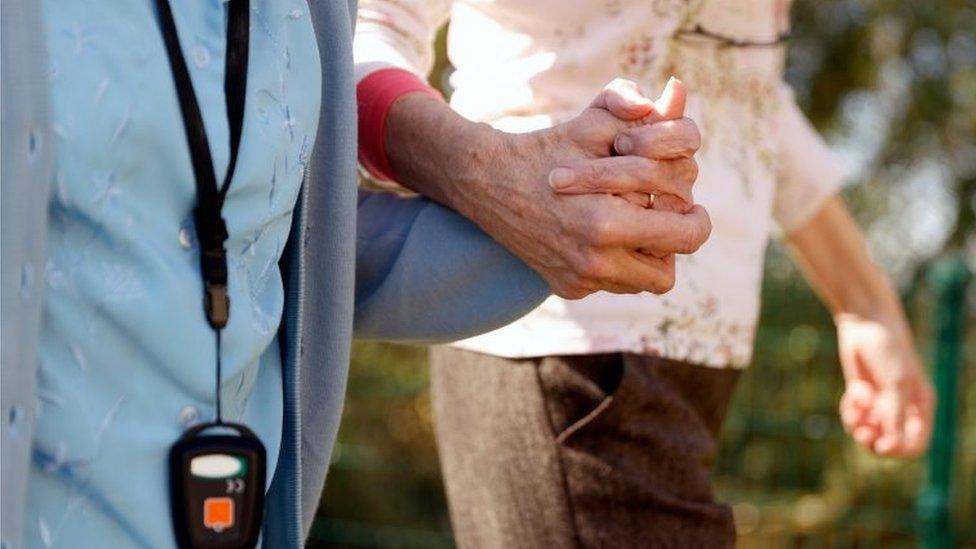Coronavirus: Care home deaths up as hospital cases fall
- Published
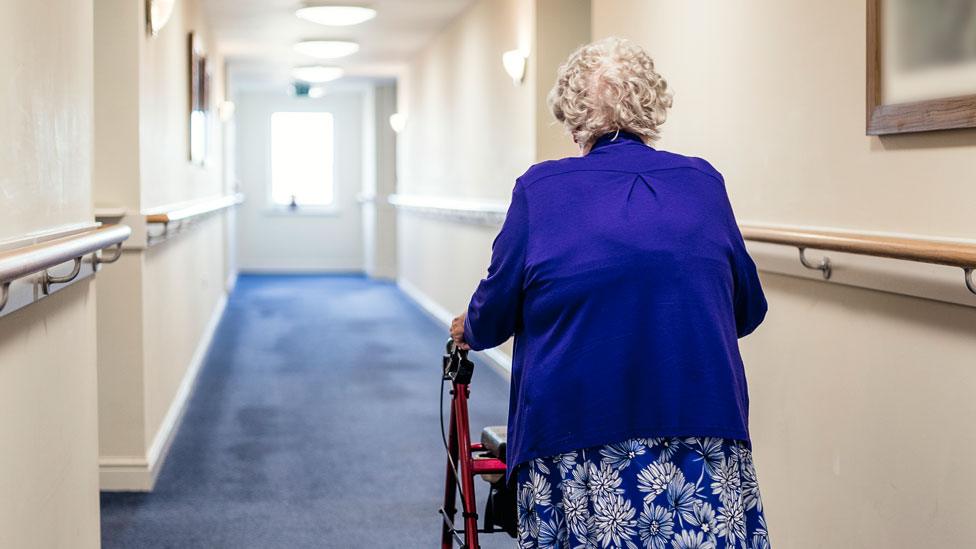
A third of all coronavirus deaths in England and Wales are now happening in care homes, figures show.
Office for National Statistics data showed there were 2,000 coronavirus care home deaths in the week ending 17 April, double the previous week.
It brings the total number of deaths in care homes linked to the virus since the start of the pandemic to 3,096.
Health Secretary Matt Hancock said testing will be expanded to all care home residents and staff in England.
This includes those who do not have symptoms, Mr Hancock told Tuesday's coronavirus briefing.
"Building on successful pilots, we will be rolling out testing of asymptomatic residents and staff in care homes in England, and to patients and staff in the NHS," Mr Hancock said.
All those over 65 and people who must leave home for work will also be able to get a test if they are displaying symptoms.
The health secretary also announced that the government would begin including the number of deaths in care homes and the community in its daily figures from Wednesday, in an effort to "bring as much transparency as possible" to the data.
Until now, the figures have only included hospital deaths.

Coronavirus deaths in hospitals across the UK have reached 21,678 - a rise of 586 from the day before - having peaked on 8 April.
However, projections for care home deaths up to 24 April suggest the numbers have continued to rise.
Another 630 deaths in care homes in Northern Ireland and Scotland have been linked with coronavirus up until mid-April.
Nearly half of coronavirus deaths in those countries are now in care homes.
'True front line'
Mike Padgham, of the Independent Care Group, which represents care homes, said they were now the "true front line" in the fight against coronavirus.
He said: "It is taking a terrible toll. These are our loved ones - mothers, fathers, brothers, sisters, aunts, uncles and friends who have been taken from us early."
Asked at the coronavirus briefing whether care homes were now the government's priority in dealing with the disease, Mr Hancock said: "Care homes have been a top priority right from the start.
"We've strengthened the rules around what happens in care homes and tightened infection control, also making testing available throughout the care sector."
Prof John Newton, co-ordinator of the national testing effort, addressing the spread of the virus in care homes, said: "We've done some intensive studies of infection in care homes.
"The presence of symptoms was not really a good marker in the care home setting, both among residents and staff, for the presence of the virus.
"There were significant numbers who were asymptomatic who had the virus and so we have massively increased the amount of testing available."
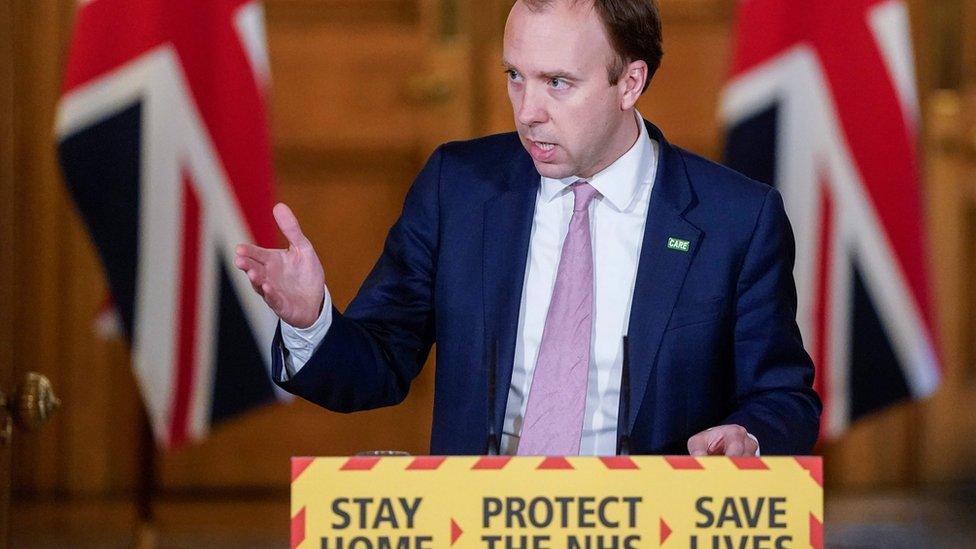
Health Secretary Matt Hancock said care homes had been a "top priority right from the start"
A key criticism of the government's approach has been the lack of protective equipment for staff and testing for staff and residents.
It was only in the middle of April that the government said all residents showing symptoms could be tested, while the Army is now helping to distribute protective kit.
But Downing Street insisted it had acted to prevent the spread of coronavirus within care homes in the early stages of the pandemic, including guidance issued banning visitors.
The prime minister's official spokesman said: "We want to do all we can to support those living and working in care homes at what we accept is an enormously difficult time."
It came as:
British Airways said it was set to cut up to 12,000 jobs from its 42,000-strong workforce due to a collapse in business because of the pandemic
The first version of a coronavirus contact-tracing app that might help the UK emerge from lockdown could be ready in a fortnight's time, an NHS chief has said
The son of an NHS doctor who died with the virus called on Health Secretary Matt Hancock to apologise for mistakes in the government's response to the outbreak
People across the UK, including Prime Minister Boris Johnson, held a minute's silence to remember health and care workers who have died with coronavirus
Scotland's First Minister Nicola Sturgeon said face coverings would be recommended for the public in enclosed spaces such as supermarkets
Two brothers with coronavirus have died within hours of one another
Black, Asian and minority ethnic staff who may need face masks or tests for Covid-19 are being prioritised by an NHS trust
All patients over 70 in Scotland who are admitted to hospital for any reason will now be tested for Covid-19, Ms Sturgeon has announced
UK holds a minutes silence for coronavirus key worker deaths

A SIMPLE GUIDE: How do I protect myself?
AVOIDING CONTACT: The rules on self-isolation and exercise
IMMUNITY: Can you catch the virus twice?
HOPE AND LOSS: Your coronavirus stories
LOOK-UP TOOL: Check cases in your area

Why official virus care home deaths may be an underestimate
The daily updates provided by the government do not include care home deaths.
The ONS has been able to track these by looking at deaths certificates, external - but that means the data lags behind the hospital deaths provided by the government.
These figures are released weekly and include people who have died who are suspected to have had the virus, not just those who have tested positive.
They also compare the overall number of people who have died with the average number of deaths at that time of year.
Up until 10 April just over 1,000 coronavirus-related deaths had been recorded in care homes so far.
A week later this had increased by another 2,000 to hit 3,096 in England and Wales.
Data provided by the Care Quality Commission, which receives reports from care homes in England, suggest the following week, up until last Friday, saw an even bigger rise.
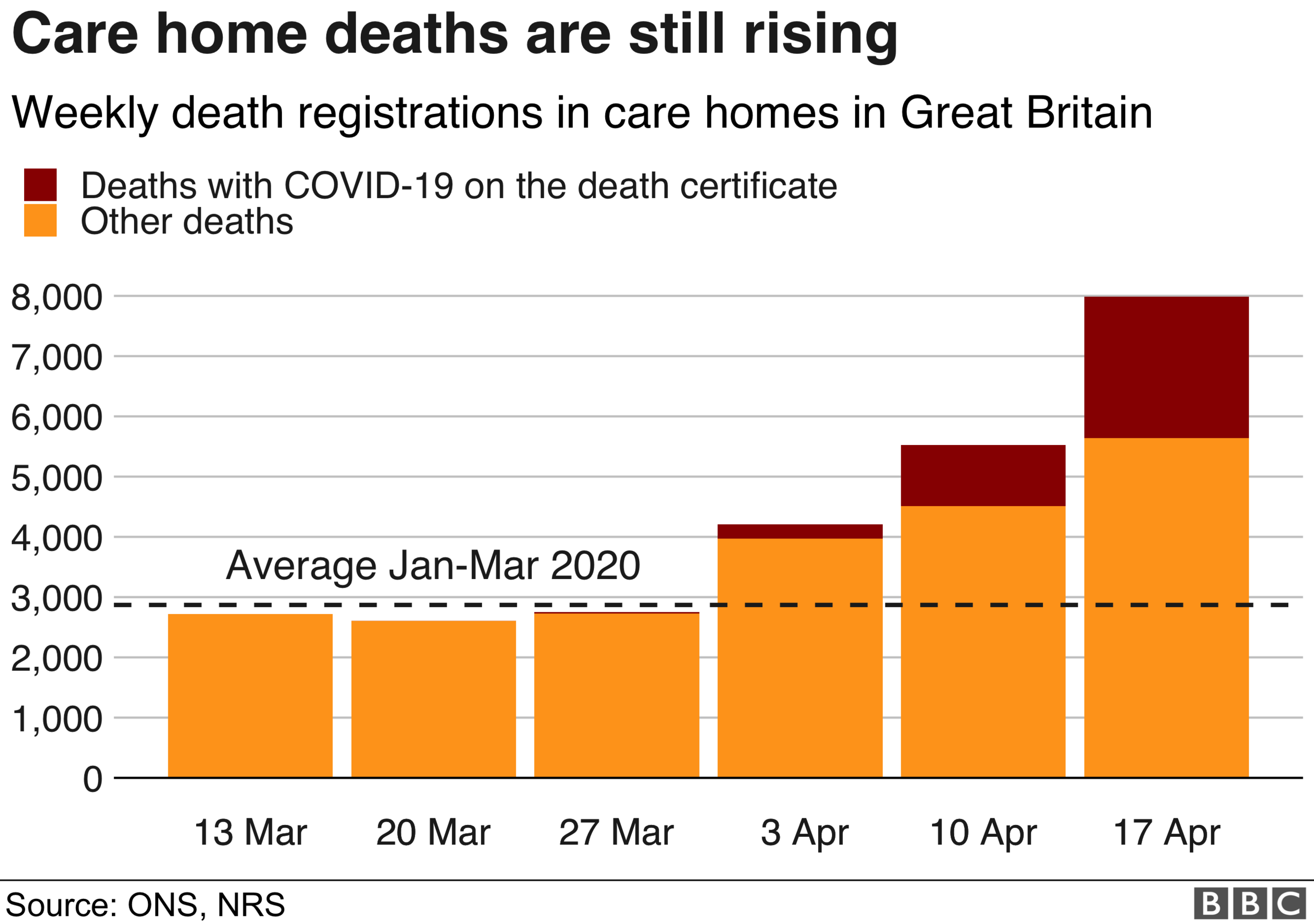
Similar trends are being seen in Northern Ireland and Scotland.
But even these figures may be an underestimate.
The overall number of people dying in care homes is now three times higher than it was before the pandemic started.
Fewer than half of these extra deaths are being attributed to coronavirus.
Labour's shadow social care minister, Liz Kendall, said it was clear that the virus was having a "devastating impact" on care homes.
"Urgent action is needed to get a grip of this problem."
What does this mean for excess deaths?
Official figures show the total number of people dying in the UK from all causes in hospitals and the community is double what we would expect for this time of year.
Government advisers say this is important to track as it reveals the indirect impact of the pandemic, from factors such as people missing out on care and dying from other conditions, as well as coronavirus deaths.

In the week to 17 April the total number of deaths in England and Wales topped 22,000 - the highest since records began in 1993.
Once you include Northern Ireland and Scotland the figures are nearly 25,000.

But BBC head of statistics Robert Cuffe said even this does not provide the full picture.
He said: "Those weekly figures do not tell us how many years of life have been lost - some people who die during the epidemic would have lived for many years, and some might have died within the next few months.
"To understand that picture, we'll have to wait to see what happens to all deaths in 2020, but that analysis is some time away."

How have you been affected by the issues relating to coronavirus? Share your experiences by emailing haveyoursay@bbc.co.uk, external.
Please include a contact number if you are willing to speak to a BBC journalist. You can also contact us in the following ways:
WhatsApp: +44 7756 165803
Tweet: @BBC_HaveYourSay, external
Send pictures/video to yourpics@bbc.co.uk, external
Please read our terms & conditions and privacy policy
- Published15 May 2020
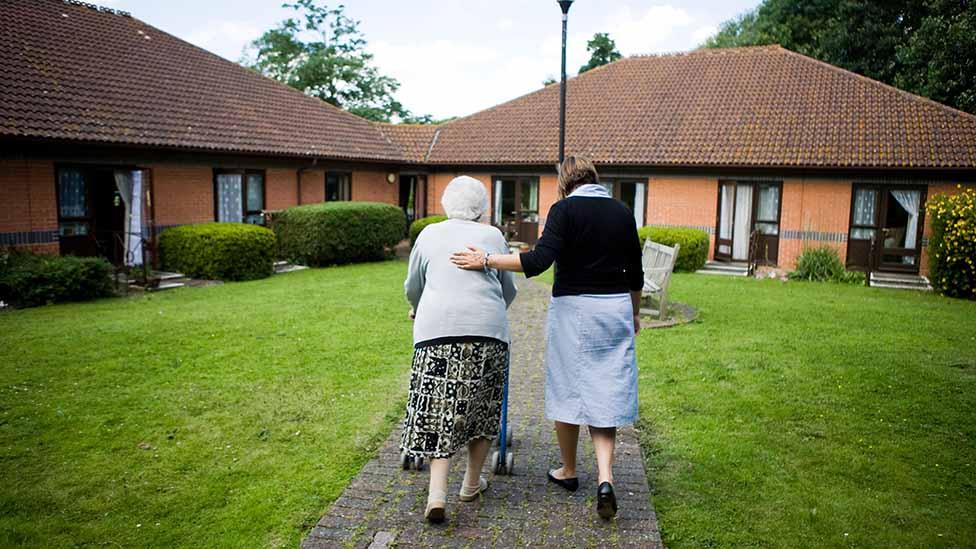
- Published16 April 2020
- Published28 March 2020
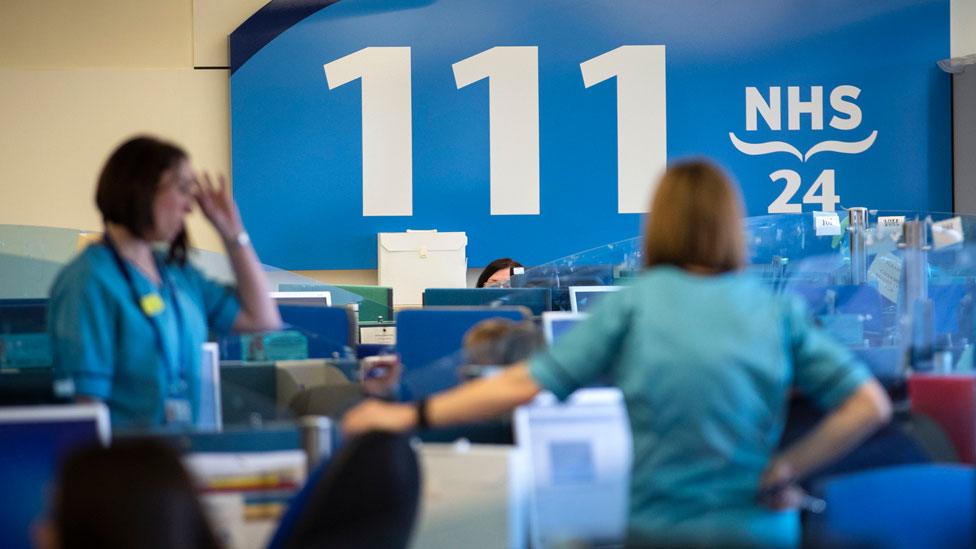
- Published14 April 2020
